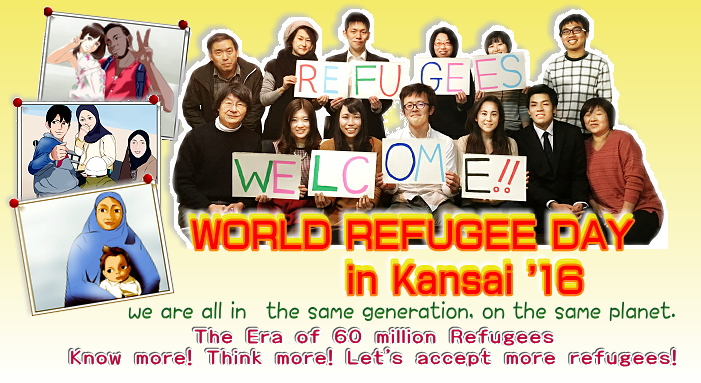 |
< top
Report
Audience Feedback
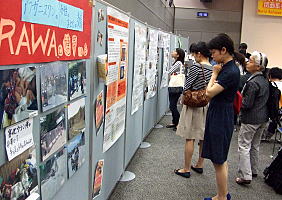 |
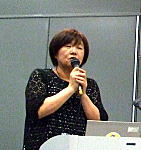 |
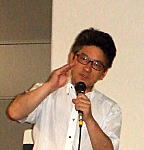 |
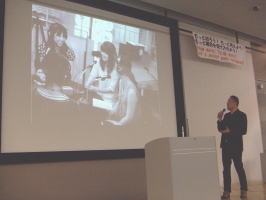 |
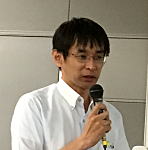 |
Upper section left:
Booths at the event.
Upper section center:
Ms. Tanaka explains
the purpose of the event.
Upper section right:
Mr. Ishii's keynote speech.
Lower berth left:
Mr. Soda's speech.
Lower berth right:
Speech by Mr. Naka (lawyer).
|
Over 150 people took part in the event overall. Following a series of lectures
and reports, guest speakers, staff members and other participants posed
for photographs while holding messages welcoming refugees to Japan.
The event opened with an explanation of the conditions facing refugees
in Japan, given by the organising committee. This explanation included
a definition of the term "refugee", a brief history of refugees
worldwide, and a description of the situation facing refugees residing
in Japan. As refugee numbers continue to increase all over the world, there
are many factors for accepting countries to consider. However, we believe
that the theme of the event, "Learn More! Think More! Accept More
Refugees!" is something that should provide plenty of motivation for
Japanese citizens. We hope that this event proves to be a means by which
people can start thinking along those lines.
"Let's Enable Ourselves to Say 'Welcome'!" a speech by Katsuya Soda of Nanmin Now!
Nanmin Now! are an organization who produce a weekly FM radio programme
of the same name in the Kyoto area. The programme's concept is to provide
listeners with information on the latest refugee-related issues, rather
like a weather forecast.
Nanmin Now! are also committed to embracing the problems facing refugees
as though they were their own. They work with other local organisations
to co-ordinate with refugees and refugee supporters to perform various
support activities. We were introduced to some of these activities at the
event.
Mr. Soda reminded us that, while there are many things we can do for refugees,
including supporting them in distant countries and welcoming them to Japan,
there are several things we need to consider before offering our support.
We need to think about the issues facing the refugees (do we know enough
about their background and lifestyles?); our role, in terms of what we
can actually do; and what effect our activities will have on the refugees
we are attempting to support.
Audience Feedback
- I got a clear understanding of what we can do here in Japan. I think the
"weather forecast" concept of providing information is really
good.
- I'm a university student, so when I heard about the activities other university
students were getting involved with, it made me wonder if there was something
I could do.
- Mr. Soda's speech was very concise and simple, and its message made a strong
impression on me. I will be thinking about the idea of issues, roles, and
effects from now on.
Keynote Speech: "Japan's Position in the Age of Refugees"
A speech by Hiroaki Ishii (Japan Association for Refugees (JAR); Forum
for Refugees Japan (FRJ)
Mr. Ishii spoke in detail about Syrian refugees and their acceptance in
Japan and across the world. He also spoke about how refugees should be
accepted, and what we, as ordinary citizens, could do. He also spoke about
how best to think about the media that reports on refugees.
Audience Feedback
- The idea of positively accepting refugees was not something I'd thought
about before, so I'd like to think about how to spread this way of thinking
from now on.
- This is the first time I'd attended an event that dealt with refugee issues.
Watching news reports doesn't give you a good understanding of the current
situation, so I was always wondering why Japan was so backward-looking
regarding these things. As Mr. Ishii discussed various things, the cause
of this attitude became clear to me.
- The speech was very easy to understand. I would have liked to hear much
more, if there had been time. I realised how many things are impossible
to understand just by reading mainstream newspapers and watching TV.
- I hadn't attended events like this or listened to speeches like this before.
I also don't go out of my way to watch the news, so I didn't have much
knowledge of these issues beforehand. Even so, the speech was really easy
to understand. The content of the speech was of interest to experts in
the field, but was also accessible to first-timers like me. I was really
impressed by that.
Speech by a Refugee; Mr. D, a Nepalese Refugee
Mr. D applied for refugee status in October 2010, and appealed against
the rejection of his application in May 2011. His case was inspected by
committee, and was eventually granted asylum along with his wife in March
2015. Mr. D now lives in Aichi prefecture, and spoke about his experiences.
In Nepal, Mr. D was a member of a royalist faction, and as a result was
attacked and persecuted by the Maoists. He fled to Japan in 2007.
After he was granted asylum in Japan, he joined the Japanese national health
insurance scheme. This enabled his health to improve enough for him to
open a shop selling Nepalese spices. He also set up a group called the
"Toyokawa Nepalese Community". The group has 78 members, who
perform voluntary work such as cleaning the streets of the local area.
Following the 2015 earthquake in Nepal, they collected money and used it
to buy warm blankets which he sent to Nepal. The group also collected money
to help the victims of 2016's Kumamoto earthquake.
Audience Feedback
- Hearing a refugee tell their own story really gave me food for thought.
- I got very emotional listening to his story.
- I found D-san's story very moving. Despite everything he's been through,
in Nepal and Japan, he still volunteers to help people both here and in
Nepal. I think that's amazing.
- I'm glad I was given the chance to listen to a refugee speak about his
own life and experiences. He explained how grateful he was to Japan - I
thought we could do with more people like him.
A Report on a Refugee's Court Case: "Let's Have Court Cases that Meet
International Standards!"
A speech by Teruo Naka, lawyer for Mr. R, an Afghan refugee who went to
court to overturn the rejection of his application for refugee status.
Mr. Naka is a lawyer representing an Afghan refugee whose case is currently
being heard in the Osaka district court. Mr. Naka provided information
about this refugee, his eligibility for asylum, and the current situation
in Afghanistan. He also told us about the claims that have made by the
Japanese government during this case, the issues with these claims and
his responses to them.
Mr. R's case will be heard in the Osaka district court in mid-July. We
invite anyone who is available to come and attend the hearing.
The Main Points of Mr. Naka's Speech
Audience Feedback
- I'm afraid to say that I was never very sure about the difference between
"refugees" and "immigrants". Of course, both groups
are humans and face difficulties, and from a humanitarian point of view,
we have to provide the same level of support. However, I was really struck
by how difficult it is for refugees in Japan; how high the barrier is for
asylum seekers. I feel like this is at least partly because the Japanese
government (and us, the Japanese people) would prefer to deny the existence
of refugees altogether.
- Japan seems to ignore the UN handbook on refugees... I think that's pretty
strange.
During breaks between lectures, we made signs bearing the message that
refugees are welcome in Japan and took photos of us holding these signs.
There were also many visitors to the various photo exhibitions and booths
set up by refugees and their supporters, and we hope that these will have
raised many interesting questions among the attendees.
Thanks to everyone who came along. We really appreciate it.
(Report by C, RAFIQ member)
pagetop
Audience Feedback
22 people responded to he questionnaire that we handed out to attendees,
and 16 people wrote their impression of the event. We're very grateful
for all this feedback. Here are the views and thoughts of 8 people who
responded. We'll bear all this feedback in mind in future.
- I think that deepening our understanding regarding refugees is the first
step towards being able to provide support for them. It will take a long
time to spread this understanding through events like these, where only
the people who want to come will attend. A lot of attention has been paid
to the school curriculum of late. While kids do learn about how people
interact with each other, they rarely get a chance to put this learning
into practice, except when picking revision partners or sport team members.
It would be good if children were given an opportunity to learn about refugees,
and to think about the issues facing them.
- Japanese people are far too oblivious of "Refugee-related issues".
I'm ashamed to say that I used to think that the reason Japan's acceptance
rate for refugees was so low was because our population was too high. Now
I think that our awareness of human rights is too low.
- There were parts of the Mr. D (the Nepalese refugee)'s speech that I couldn't
catch. It would have been helpful to have a presenter or moderator on stage.
- I'm very interested in refugee-related issues, so when I read about this
event on the internet I definitely wanted to attend. I learned a lot, it
was a very worthwhile day for me. Thank you.
- I've read about refugee-related issues and so on, but attending this event
really gave me a real feel for the problems they face, so it was really
worthwhile for me. Thank you very much. I'm in a position to spread the
word about these issues, so I'm going to try and do that.
- I attended last year as well, but every time I learn something new. I hope
events like these can change the awareness and attitudes of the Japanese
people.
- Japan don't support or accept refugees in the same way as other countries.
I hope we can increase our awareness of refugees and learn to coexist with
them.
- The Nepalese refugee came all the way to attend the event, so it would
have been good to give him more time and provide an interpreter. Hearing
refugees tell their stories in their own words will definitely have a big
effect on Japanese people's understanding of these issues. I think you
should draw more attention to the fact that refugees will be attending
these kinds of events.
pagetop
|
Organisers: World Refugee Day 2016: West Japan Assembly Organising Committee
Affiliated Organisations: BRC-J (Burmese Relief Centre Japan); PASTEL (Ritsumeikan University's
Refugee Research Group);
J-FUN Youth Kansai (K.G.); The Social Guild; RAWA; Nanmin Now!; Neo Namin
Cafe Netowrk; RAFIQ,
Thanks & Dream (An organisation for evacuees from the Tohoku Earthquake
in western Japan); and others)
Supporters: UNHCR Japan; Amnesty International Japan; JLNR; JAR; FRJ; the Kansai NPO
Alliance
Cooperators:Nanmin Now!; the Yoyogi Animation School, Osaka
Office:RAFIQ Japan (The Network aiming at the Coexistence with the Refugees in
Japan)
mailto: rafiqtomodati@yahoo.co.jp
6-24 Oote-cho Takatsuki City, Oosaka 569-0078 FAX: 072-684-0231
Copyright (C) World Refugee Day 2016: West Japan Assembly Organising Committee,
All Rights Reserved. |
|